The most exciting thing happened this week! I found out there is a small fourth of July shop is opening up for Diwali. We piled up the kids in the car and gleefully bought buckets of crackers. Finally after a decade, the five days beginning Friday October 28th to November 1st of 2016 we will be celebrating Diwali in the classic sense. With the sparkle of lights, the crackling sounds of firecrackers and the warmth of them bursting in the cool night.
It has been kind of anticlimactic though, that in the past few years the bursting of crackers in India and other regions where it is celebrated you find a sense of disdain for the same. This is due to the lack of moderation, namely spending a lot on crackers and bursting them all night long and into the early morning hours. The smoke and sound generated has led to many parents choosing to just save money by foregoing crackers completely which is the opposite end of the spectrum. In USA we have only this year found this small joy and to my glee, here fire crackers that are allowed in your back yard are those that create little to no noise. I am so excited to share this experience with my children and friends this year. Of course, Diwali is not just about bursting crackers.
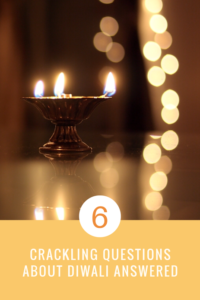
What is Diwali ?
Diwali is essentially a series of five days –
1. Dhanteras.
2. Choti Diwali (Naraka Chaturdasi).
3. Badi Diwali (Laxmi Puja).
4. Naya Saal (New Year).
5. Bhai Dooj.
When you traditionally buy silver/gold/new utensils for the kitchen. Hang up the toran (door decor) and create the rangoli. You line diyas (as shown in picture) outside your house. Choti Diwali and Badi Diwali are the actual Diwali days on which you pray for well being and prosperity of your family. Badi Diwali is the last day of the Hindu calendar and thus specially auspicious. Naya Saal is when you wish all your near and dear ones a very Happy New Year as the new Hindu year begins. Bhai Dooj is a day for siblings to grow close as we cherish their love and pray for their well being.
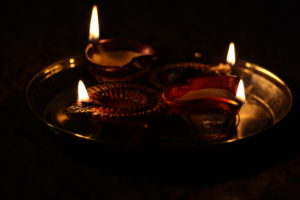
How to Celebrate Diwali?
- Clean the house, including organizing and deep cleaning.
- Buy gold, silver and kitchen for the home.
- Light diyas, line them outside the door and around the house.
- Whip up and relish multiple sweet and savory dishes all through the festive days.
- Put up door decor (toran) that can be made with flowers or cloth to welcome good vibes.
- Make Rangoli (intricate designs with colored powder or these days chalk) outside your door.
- Put up string lights outside or/and inside your house.
- Wear new and festive clothes.
- Making wheat or earthen diyas.
- On Bhaidooj, siblings share gifts.
- Light fire crackers to enjoy on Diwali days.
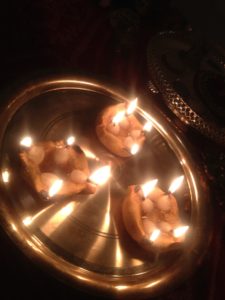
What does Diwali Signify?
India is a land of many languages and sub cultures. Diwali, originally known as Deepavali is celebrated by Indians all over the world and for different reasons.
Hinduism
Every mythological story Diwali is derived from teaches that good will always triumph over evil.
In the Ramayan, when Lord Ram returned home, the city was lit up with diyas and the people rejoiced as the prodigal son returned home.

Lord Ram, the most beloved prince and son is sent to exile by his father because of a promise he made to one of his wives (granting any two wishes when she wants). Laxman, his devoted brother chooses to go on exile with his brother and sister in law Sita. After years of hardships, Sita one day sees a deer she desires and on her behest Sri Ram and Laxman go after it. She consequently gets kidnapped by Raavan when she crosses the Laxman rekha (a spellbound line made outside their home to keep her safe by her brother in law). Ram and Laxman slay Raavan, saving her with the help of Hanuman an ardent devotee of Sri Ram. They all come back home to Ayodhya (on Diwali) among great pomp and show only to send her into exile all on her own when a citizen of the city raises a question of her purity after living with Raavan for so many years. She goes into the forest where she brings up her two sons. After years, when his sons cross his path in battle, Lord Ram goes back to bring his wife home. She in turn chooses to go back to Mother Earth instead.
South India
In South India, Lord Krishna slaying Narakasura. Narakasura was a demon drunk with power stole the earrings of Aditi (mother of all Devas) and kidnapped 16000 women. The Devas were unable to stop him and so they went to Lord Vishnu to reincarnate as Krishna, so as to destroy the evil demon and save the women.
Marwaris and Gujratis
Diwali is the new year time for Marwaris and Gujaratis. This is when the merchants close the accounts of the old year and pray to the goddess of wealth that the new year should open with even bigger increase of trade. Kali Chaudas is devoted to the worship of Maha-Kali or Shakti as this is the day Kali killed the wicked Raktavija. Also referred to as Narak-Chaturdashi, Kali Chaudas is the day to abolish laziness and evil. Thus, many regions pray to Goddess Laxmi (giver of weath) on this day.
Jainism
To the Jains it marks the day after Lord Mahavira attained nirvana. He was released from his worldly body on the night of the full moon. So the people of Pavapuri, where he attained nirvana, lit lamps in their doorways as a symbol of their guru’s enlightenment.
Sikhism
This day for Sikhs celebrates the release of Guru Hargobindji along with 52 Indian kings who were imprisoned along with him at the Gwalior fort by Emperor Shah Jahan in 1619. This day is thus also known as Bandi Chorr Diwas (meaning the day of freedom).
Nepal
Diwali is also celebrated in Nepal and the Indian states of Assam, Sikkim and Darjeeling in West Bengal. The five-day festival in these places is considered to be of great importance as it shows reverence to not just the humans and the Gods, but also to the animals like crows, cows and dogs who maintain an intense relationship with humans.
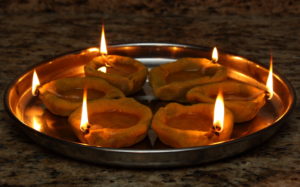
What does Diwali Teach Kids ?
- Love your family.
- Respect those you care about.
- Listen to your parents.
- Support your loved ones always.
- Stand by what is right.
- Freedom is a birth right.
- Choices have consequences.
- Women should be nurtured.
- Every woman has a right to make her own choices.
- Above all, be loyal.
- Be careful about spending and save.
Do Not –
- Think ill of others.
- Let ego get in the way of your relationships.
- Disrespect those you care about.
- Make decisions in haste.
- Be selfish or greedy.
- Pay heed to the negative voices.
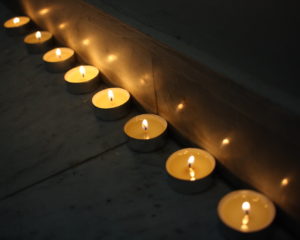
How to Light Crackers and Diyas/Candles Safely ?
This is an important and often neglected aspect of the celebrations.
- Buy fireworks from a licensed shop.
- Always keep the fireworks in a closed box, away from kids and sources of fire.
- Read the instructions and follow all safety precautions.
- Burst crackers in your backyard or open spaces, not on roads or common areas where cars may be present.
- While lighting the crackers, stand 6 feet away from next person.
- Discard used fireworks in a bucket of water.
- Wear thick cotton clothes and foot wear while bursting crackers, so as to ensure maximum safety from fire.
- Adults should always be present with kids.
- Put your vehicles in a garage.
- Don’t dare to examine crackers that did not burst. Leave them!
- Never ever light a cracker while holding it in your hand.
- When crackers take time or do not ignite immediately, do not keep in trying to burst them.
- Don’t keep your face close to the cracker while trying to light it.
- Alcohol and fireworks do not mix. Have a “designated shooter.
- Be courteous to your neighbors. Do not light crackers way into the night.
- Obey local laws. If fireworks are not legal where you live, do not use them.
- Candles/Diyas should be kept out of reach of children.
- It is best if there is only enough wick to last evening.
- If you leave a room, ensure all candles and diyas are extinguished.
What does Diwali Mean to Me?
Every year I try to make my home smell and feel similar to how my mom’s did in all the years I was growing up. Diwali is has not but one aspect. It is the crisp, cool air that comes around this time. A fresh, elaborately decorated home. It is the excitement of new clothes, jewelry, kitchen utensils and decor coming into the home. Diyas and candles everywhere. The smokey warmth, lights and shine of sparklers circling in the air. It is the huge spread of spicy, hot, sour savories and sweet dishes spread out on the dinner table. It is this smell of mom’s cooking wafting through the home bringing back memories of all the years gone by. One by one each candle is lit up, sending vibes through the house to turn into a haven for you. Though, in the past few years as you can see I have taken to making my own diyas which is my own little tradition and I am loving it.
When I was young I did not understand and even negated the beauty of the mythology of Ramayan. I could not find respect in my heart for a man who would exile his wife for no fault of her own. But now, over the years I have understood that it is not just a story to glorify God in the incarnation of Ram.
It is a story where it is proven that even Gods when in human form can make mistakes. So, we should not be so hard on ourselves when we happen to do the same. It teaches us that choices have consequence and we need to accept them and move on. That when fathers make thoughtless decisions, children have to suffer. When people get selfish, the reward is nothing but pain. That when you do not pay heed to the warnings of those you love, you suffer. That not respecting women, can lead to the downfall of even Kings. That the happiness one feels when a child comes home is priceless. That when disrespected, any woman can choose to part ways with her husband. But that is of course my interpretation. Anyone who reads scriptures or mythology derives their own meanings and using them to grow in their own life!
And all of that is the true essence of Diwali. So, now you know that when you wish someone this festive season you are wishing them a life lived well in truth, righteousness and perseverance!! Wishing you all a very Happy and Prosperous Diwali!
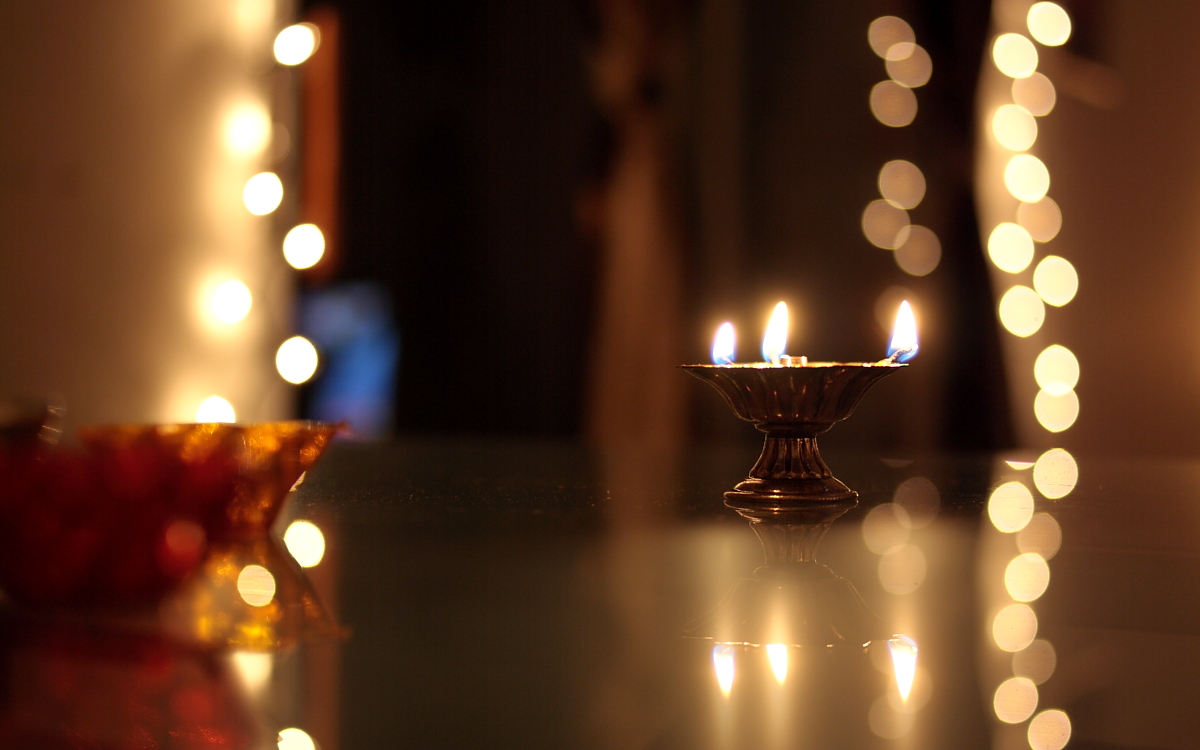
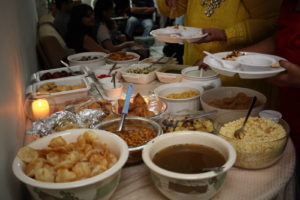
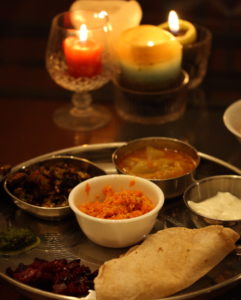
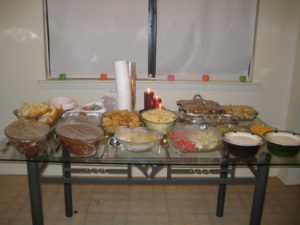
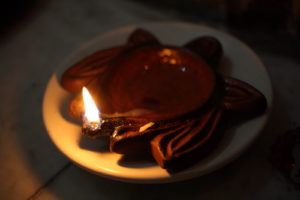
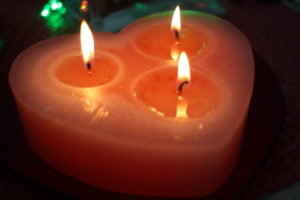
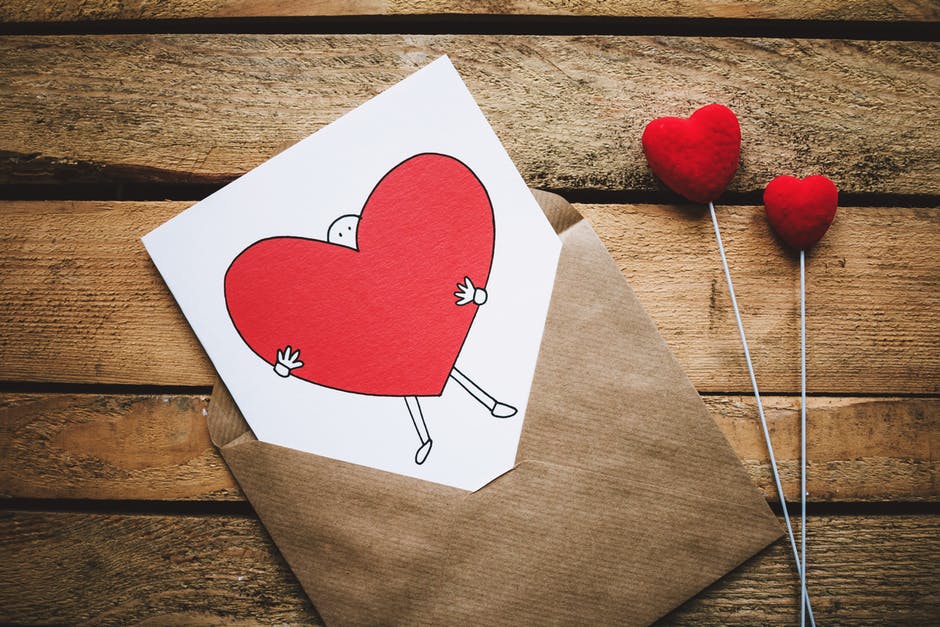
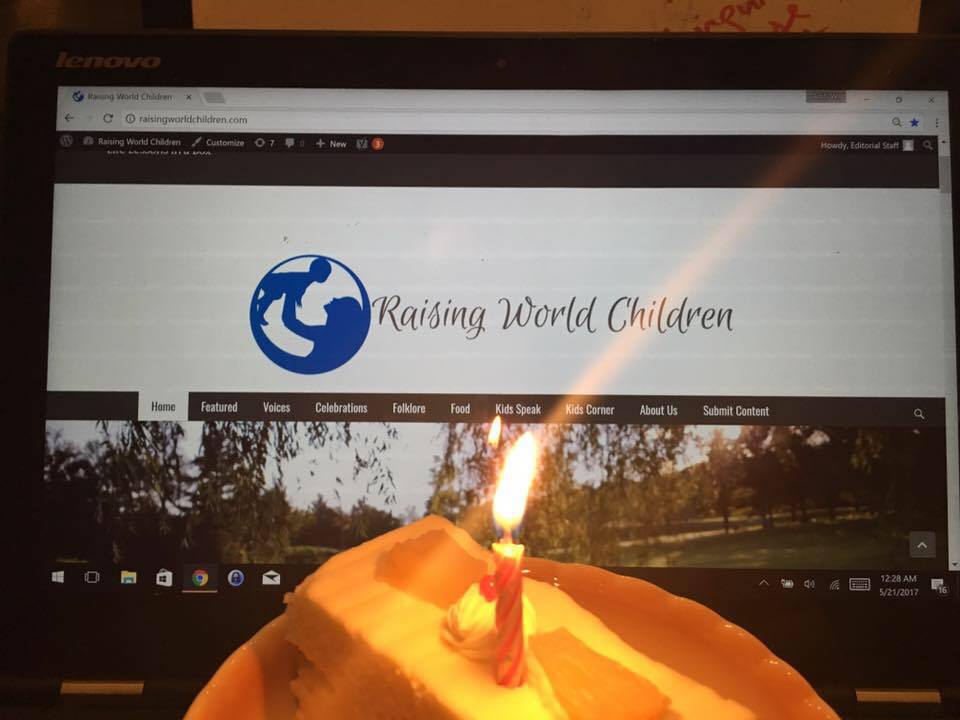

Had no knowledge about these traditions, great that you are teaching your children and carrying on something you remember from your childhood.
This is fascinating. I love reading about other countries, religions and cultures. I was wondering what Diwali was. Thank you for you clear descriptions.
Thanks for sharing this. It was interesting to read and I hadn’t familiarized myself with Diwali before today! I hope you and your family enjoy the celebrations. 🙂
Thank you for this presentation of Diwali. I didn’t know that it was about the triumph over evil of good.
I wish this had existed a few years ago, when I was googling and not finding complete info on this. Thanks for helping to enlighten others 🙂
what a beautiful holiday. Filled with so much honour and love.
I loved reading about Diwali! It is always so fascinating to learn about other cultures, thank you so much for sharing. 🙂
Best,
Bibi